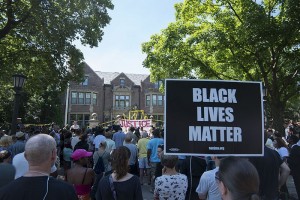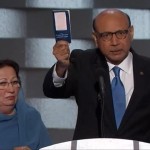 By now, you know whether or not Alton Sterling and Philando Castile had criminal records. As if that justifies either of them being shot and killed by police while pinned to the ground or while sitting in a car with a four-year-old in the back seat.
By now, you know whether or not Alton Sterling and Philando Castile had criminal records. As if that justifies either of them being shot and killed by police while pinned to the ground or while sitting in a car with a four-year-old in the back seat.
One day I got my neighbor’s “rap sheet” in the mail.
At least that’s what the sender, another neighborhood resident, called the printout of mostly traffic violations attached to the name of a young black man who has occasionally lived next door to me over the years.
That young man doesn’t live there now.
He isn’t the one who was taken away in handcuffs in the incident I wrote about last summer in the newspaper, the op-ed that compelled the sender to turn on a computer, research public records, print out some of those records, get out a personalized notecard, write a note of faux concern for me, and head to the post office.
The handwritten note came to me about a month after the piece was published in the local paper, and a couple of weeks after it gained widespread and negative attention online when a graduate of the institution at which I teach posted a picture of it on one of the institution’s social media pages, demanding to be taken off the institution’s mailing lists and declaring his intention to encourage other alumni to do likewise since I was a “leftist” responsible for fanning “racial fires and anti-police sentiment.”
That online fury erupted last summer as Fox News insisted that the Black Lives Matter movement was a hate group inciting violence against police. It is not, no matter what some would have you believe: “The Black Lives Matter Network advocates for dignity, justice, and respect.” The fact that anyone takes offense to the claim of value for black life makes the point for itself.
That fury around my op-ed gained momentum last year during the week that conservative media in particular was covering the death of a Fox Lake, Illinois, police officer lauding his heroism while local schools were on lockdown as law enforcement searched for his supposed killers. The governor ordered flags to be flown at half mast, it was such a big deal. The echo chamber of conservative media ran with the “war on police” story and fed into Facebook furor.
Of course, the story undergirding that moment of frenzy soon unraveled when it became clear that Fox Lake police officer Joseph Glinewicz staged his own death, now known to be a suicide, to get out from under the web of corruption, theft, and deceit that he had woven around himself.
They don’t need me to fan anti-police sentiment. They’re doing that all on their own.
This wasn’t the first time I have been criticized by local residents and even alumni for things I have written in the media and professional work in which I have engaged. I’m sure it won’t be the last. And that’s fine with me. One does not write about justice, politics, and religion in public in order to not be paid attention to.
This is what it looks like to be a progressive writer who talks about race and gender justice in a conservative region of the country. A professor at a college in a small town. A white woman publicly scolded and corrected by older white men I don’t really know for talking about racism and sexism in public.
It doesn’t come without a cost, but I’ll keep doing it as long as the first response to news of police violence is to criminalize the black bodies who are too frequently its target.
Image of protest in response to Philando Castile shooting via wikimedia commons.












